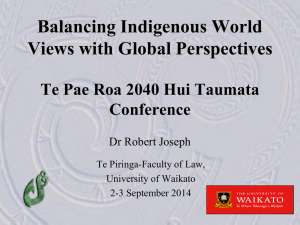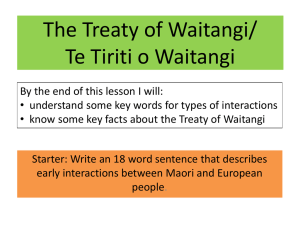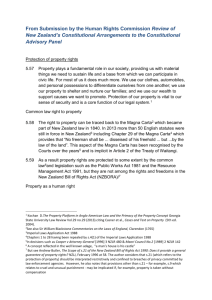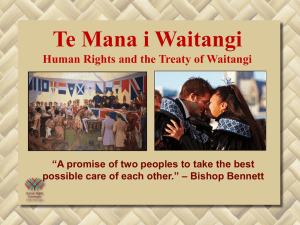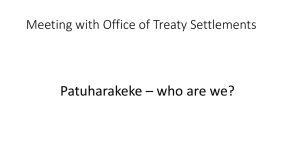Ruawaipu Iwi Claims Settlement Authority
advertisement
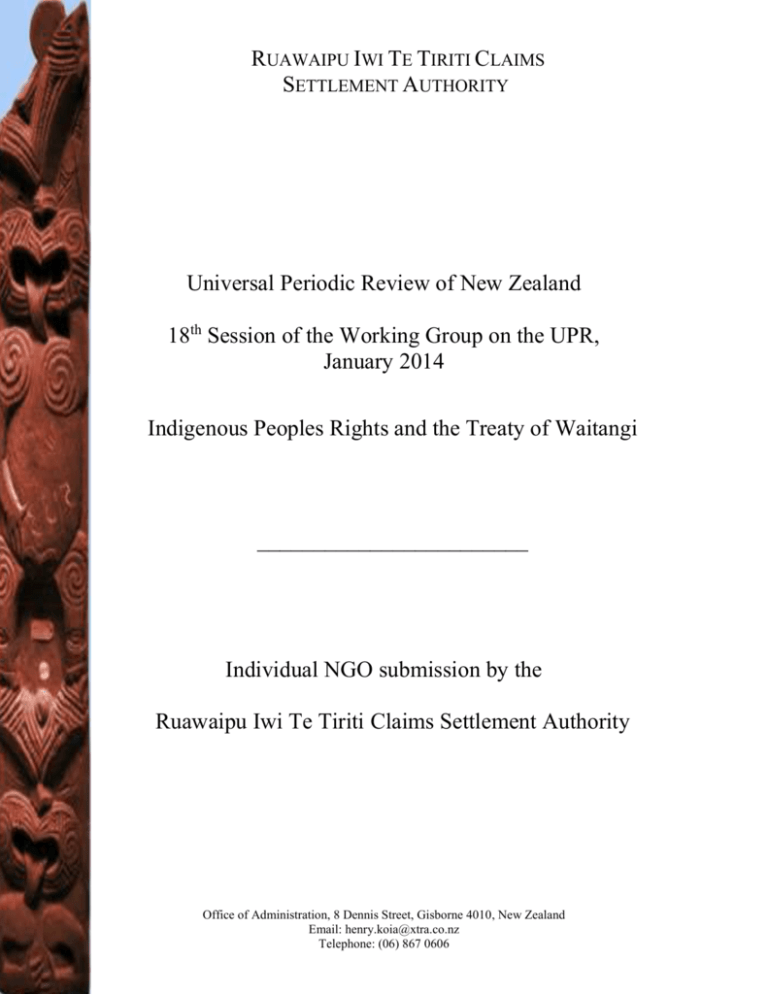
RUAWAIPU IWI TE TIRITI CLAIMS SETTLEMENT AUTHORITY Universal Periodic Review of New Zealand 18th Session of the Working Group on the UPR, January 2014 Indigenous Peoples Rights and the Treaty of Waitangi ________________________ Individual NGO submission by the Ruawaipu Iwi Te Tiriti Claims Settlement Authority Office of Administration, 8 Dennis Street, Gisborne 4010, New Zealand Email: henry.koia@xtra.co.nz Telephone: (06) 867 0606 2 Introduction 1. Ruawaipu is a Maori tribe that is indigenous to New Zealand, and is separate and distinct from every other tribe. The Ruawaipu Iwi Te Tiriti Claims Settlement Authority (“the Authority”) was established by Ruawaipu on 10 April 2010. The Authority was duly mandated by Ruawaipu to act on behalf of Ruawaipu in respect of all aspects pertaining to the just and expeditious settlement of all Ruawaipu historical Treaty of Waitangi claims before the Waitangi Tribunal. 2. In April 2012, the New Zealand government, in the face of Ruawaipu protest, enacted the Ngati Porou Claims Settlement Act 2012. That Act removed the jurisdiction of the Waitangi Tribunal from inquiring or further inquiring into Ruawaipu historical Treaty of Waitangi claims without the free prior and informed consent of Ruawaipu. 3. This submission has been prepared by the Authority for the purpose of informing the Universal Periodic Review of the New Zealand government’s abuse of Ruawaipu indigenous rights. The situation regarding the New Zealand government’s unilateral extinguishment of Ruawaipu’s Treaty claims before the Waitangi Tribunal 4. In 2003 Ruawaipu’s first historical claim based on the Treaty of Waitangi was submitted to the Waitangi Tribunal. 5. By 2012 Ruawaipu had 48 historical claims pending determination before the Waitangi Tribunal. 6. These claims were founded on the following premises (1) Ruawaipu did not cede sovereignty over their lands to the British under the authentic version of the Treaty of Waitangi; and (2) Ruawaipu are the rightful owners of the lands and natural resources situated within their traditional boundaries (not the Ngati Porou tribe). 7. The New Zealand government and the Ngati Porou political elite led by Dr Apirana Mahuika colluded to enact the Ngati Porou Claims Settlement Act 2012. That Act came into force on 5 April 2012 and removed the jurisdiction of the Waitangi Tribunal from inquiring into Ruawaipu historical Treaty of Waitangi claims so as (1) to defeat the legitimate challenges by Ruawaipu to British sovereignty over Ruawaipu lands; and (2) to defeat the legitimate challenges by Ruawaipu to Ngati Porou’s false claims of traditional ownership of Ruawaipu lands. 8. The Waitangi Tribunal, the High Court, Prime Minister John Key, Treaty Minister and Attorney-General Christopher Finlayson, the Maori Affairs Select Committee that considered the Ngati Porou Claims Settlement Bill which included Parekura Horomia of the Ngati Porou tribe, Justice Minister Judith Collins, the Human Rights 3 Commission, the Governor-General, and the New Zealand Parliament, each being empowered to take some special measure to protect Ruawaipu rights and interests from a bogus settlement process and the ensuing settlement Act, failed or refused to do so. 9. After the Act came into force, a public notice calling a Ruawaipu tribal meeting was advertised in the Gisborne Herald Newspaper on 21st April 2012 to commence on 28 April 2012 at 11 a.m. at 131A Rutene Road, Gisborne to consider the ratification by Ruawaipu of the draft “Declarations and resolutions of the Ruawaipu indigenous people regarding New Zealand’s abuse of Ruawaipu human rights” (a copy is attached to this submission). 10. At that meeting, Ruawaipu made the following declarations: 10.1. Ruawaipu declare that at no time did Te Runanga o Ngati Porou have the mandate of Ruawaipu to negotiate the comprehensive settlement of all Ruawaipu historical Treaty of Waitangi claims on behalf of Ruawaipu; and 10.2. Ruawaipu declare that the Ruawaipu Iwi Te Tiriti Claims Settlement Authority established by Ruawaipu on 10 April 2010 is the organisation duly mandated and authorised to represent Ruawaipu in respect of all aspects pertaining to the just settlement of Ruawaipu historical Treaty of Waitangi claims; and 10.3. Ruawaipu declare that signatures to a petition that the government relied on for its decision that Ruawaipu claims were appropriately included within the scope of Te Runanga o Ngati Porou’s mandate were acquired under a false pretence and that the government has failed or refused to carry out a proper inquiry into the fraud allegations in order to avoid the political implications for the government if the fraud allegations were to be proved; and 10.4. Ruawaipu declare their rejection of the Ngati Porou Treaty settlement as a valid settlement of Ruawaipu historical Treaty of Waitangi claims as the settlement has the aim or effect of settling such claims without the free, prior and informed consent of Ruawaipu; and 10.5. Ruawaipu declare their refusal to recognise the Ngati Porou Claims Settlement Act 2012 as legally valid given that the Bill was unlawfully introduced to Parliament when Attorney-General Christopher Finlayson refused to comply with the mandatory requirements of section 7 of the New Zealand Bill of Rights Act 19901 so 1 Section 7 NZBORA required the Attorney-General Christopher Finlayson to bring to the attention of the House of Representatives at the time the Bill was introduced to the House of Representatives any provisions in the Bill that appeared to be inconsistent with any of the rights and freedoms contained in the NZBORA. Clauses 12 and 13 of the Bill, had the aim of blocking the Waitangi Tribunal from inquiring into Ruawaipu historical Treaty of Waitangi claims. Those provisions were therefore inconsistent with section 27(1) NZBORA which affirms the right of Ruawaipu claimants to the observance of the principles of natural justice by the Waitangi Tribunal when pursuing their claims. Christopher Finlayson did not do so. Christopher Finlayson refrained from doing something he reasonably ought to have known the law required him to do so as not to interfere with his political objectives and Treaty Minister responsible for the Bill. 4 as not to interfere with his political objectives as Treaty Minister in charge of the Bill; and 10.6. Ruawaipu declare their historical Treaty of Waitangi grievances against the British Monarch (the Crown) as unresolved; and 10.7. Ruawaipu declare that the government’s policy of settling historical Treaty of Waitangi claims with large natural groupings has been purposely misapplied in the East Coast district case in order to meet a political agenda, as the Ngati Porou party to the settlement does not represent a large natural grouping. Instead it represents an artificial construct engineered in the aftermath of the 1865 East Coast war; and 10.8. Ruawaipu declare that the New Zealand government’s refusal to recognise Ruawaipu as a distinct tribal entity separate from Ngati Porou, is a violation of the human rights of Ruawaipu to be different from Ngati Porou, to be considered different from Ngati Porou, and to be respected as such, such right being affirmed in the United Nations Declaration on the Rights of Indigenous Peoples; and 10.9. Ruawaipu declare that the Ngati Porou Claims Settlement Act 2012 which, without Ruawaipu free, prior and informed consent, removes the jurisdiction of the Waitangi Tribunal from inquiring into Ruawaipu historical Treaty of Waitangi claims, abuses Ruawaipu rights to justice before the Waitangi Tribunal as recognised by section 27(1) of the New Zealand Bill of Rights Act 1990; and 10.10. Ruawaipu declare that the government’s airing of grievances procedure which Member of the New Zealand House of Representatives Nanaia Mahuta advocates as a government ‘innovation’ does not restore to Ruawaipu their section 27(1) New Zealand Bill of Rights Act right and is nothing more than a government sham designed to trick James Anaya the United Nations Special Rapporteur on the Rights of Indigenous Peoples into thinking that the government has adopted his recommendation2 that it take special measures to address the concerns of Ruawaipu in the Waitangi Tribunal’s East Coast District case; and 10.11. Ruawaipu declare that the Ngati Porou Claims Settlement Act 2012 abuses Ruawaipu indigenous rights enshrined in the United Nations Declaration on the Rights of Indigenous Peoples as follows: 10.11.1. The Act is based on the incorrect and unproven assumption that Ruawaipu are not a distinct tribal people. This contravenes Article 7 of the United Nations Declaration on the Rights of Indigenous Peoples (“UNDRIP”) which affirms the collective right of indigenous peoples to live as distinct peoples; and 2 In his 31 May 2011 Addendum report on the situation of Maori people in New Zealand (AHRC/18/35/Add.4) James Anaya recommended (at para 73) that the government should take special measures to address the concerns of the Ruawaipu, Ngati Uepohatu and Te Aitanga-a-Hauiti iwi, in relation to the East Coast District settlement case. 5 10.11.2. The Act dispossesses Ruawaipu of their lands, territories, and resources, and subjects Ruawaipu to forced assimilation or integration by a Ngati Porou culture or way of life imposed by legislative measures in violation of Article 8 of the UNDRIP which affirms the rights of indigenous peoples and individuals not to be subjected to forced assimilation or destruction of their culture; and 10.11.3. The Act results from a settlement process that has allowed for only Ngati Porou participation. Ruawaipu tribal members who wished to participate to express their opposition to the process, had to give up their Ruawaipu tribal identity and pretend they were Ngati Porou. This situation contravened Article 9 of the UNDRIP which affirms the rights of individuals to belong to a Ruawaipu indigenous community in accordance with Ruawaipu traditions and customs; and 10.11.4. The Act propagates a false history to the detriment of the Ruawaipu people. The powerful write out the powerless by denying their agency and the legitimacy of their beliefs or actions. This contravenes Article 15 of the UNDRIP which affirms the right of the Ruawaipu people to the dignity and diversity of their culture, traditions, histories and aspirations, and the right to have their culture, traditions, histories and aspirations appropriately reflected in public information; and 10.11.5. The Act results from a settlement process that has denied Ruawaipu participation in a process that has affected their rights. Only Ngati Porou were allowed to participate in the process of mandating Te Runanga o Ngati Porou, and the process of ratifying the deed of settlement. After the Ruawaipu people had established the Ruawaipu Iwi Te Tiriti Claims Settlement Authority (“the Authority”) to represent Ruawaipu in respect of the settlement of Ruawaipu claims, Treaty Minister Finlayson refused to recognise the Authority. This contravened Article 18 of the UNDRIP which affirms the rights of indigenous peoples to participate in decision-making in matters which would affect their rights, through representatives chosen by themselves in accordance with their own procedures; and 10.11.6. The Act results from a settlement process where at no stage did the New Zealand government consult and cooperate in good faith with the Ruawaipu people through their own representative institutions in order to obtain their free prior and informed consent before introducing the Ngati Porou Claims Settlement Bill to the House of Representatives intended to remove the jurisdiction of the Waitangi Tribunal to inquire into Ruawaipu historical Treaty of Waitangi claims. This contravenes Article 19 of the UNDRIP which provides that States shall consult and cooperate in good faith with the indigenous peoples concerned through their own representative institutions in order to obtain their free, prior and informed consent before adopting and implementing legislative or administrative measures that may affect them; and 6 10.11.7. The Act legalizes a settlement that does not provide just and fair redress to the Ruawaipu people for Crown acts and omissions done in breach of Treaty principle that has deprived them of their subsistence and development. This contravenes Article 20 of the UNDRIP which provides that indigenous peoples deprived of their means of subsistence and development are entitled to just and fair redress; and 10.11.8. The Act legalises the illegitimate transfer of lands and resources to the Ngati Porou people which under customary law belong to the Ruawaipu people. This violates the rights of the Ruawaipu people to maintain and strengthen their distinctive spiritual relationship with their traditionally owned or otherwise occupied and used lands, territories, waters and coastal seas and other resources and to uphold their responsibilities to future generations of Ruawaipu people in this regard as affirmed in Article 25 of the UNDRIP which provides that indigenous peoples have the right to maintain and strengthen their distinctive spiritual relationship with their traditionally owned or otherwise occupied and used lands, territories, waters and coastal seas and other resources and to uphold their responsibilities to future generations in this regard; and 10.11.9. The Act fails to recognise the right of the Ruawaipu people to the lands, territories, and resources which they have traditionally owned. The Act fails to accord legal recognition and protection to Ruawaipu lands, territories and resources with due respect to Ruawaipu customs, traditions and land tenure systems, in violation of Article 26 of the UNDRIP which affirms the right of indigenous peoples to the lands, territories and resources which they have traditionally owned, occupied or otherwise used or acquired and provides that States shall give legal recognition and protection to these lands, territories and resources. Such recognition shall be conducted with due respect to the customs, traditions and land tenure systems of the indigenous peoples concerned; and 10.11.10. The Act fails to provide the Ruawaipu people with redress for the lands, territories and resources which they have traditionally owned which have been taken without their free, prior and informed consent in violation of Article 28 of the UNDRIP which affirms the rights of indigenous peoples to redress, by means that can include restitution or, when this is not possible, just, fair and equitable compensation, for the lands, territories and resources which they have traditionally owned or otherwise occupied or used, and which have been confiscated, taken, occupied, used or damaged without their free, prior and informed consent; and 10.11.11. The Act illegitimately transfers lands and resources to the Ngati Porou people which under customary law belong to the Ruawaipu people. This impedes the right of the Ruawaipu people to determine and develop strategies for the development or use of their lands or territories and other resources in contravention of Article 32 of the UNDRIP which affirms the rights of indigenous peoples to determine and develop priorities and strategies 7 for the development or use of their lands or territories and other resources; and 10.11.12. The Act is based on the incorrect government assumption, without any evidence, that a Ruawaipu tribal identity does not exist. The Act therefore contravenes Article 33 of the UNDRIP which affirms the rights of indigenous peoples to determine their own identity in accordance with their customs and traditions; and 10.11.13. Ruawaipu declare that there is a pressing need for the United Nations to sanction and coordinate the establishment of the New Zealand Maori Protectorate, being an institution independent of the settler government and mandated by Maori to protect Maori rights, given the reality that New Zealand’s Human Rights Commission is not an effective intervening mechanism for protecting the human rights of vulnerable Maori. 11. As a consequence of the above declarations, being determined more than ever to bring the ends of justice for themselves and future Ruawaipu generations, and to ensure that New Zealand’s settler establishment was held to account for its human rights abuses against them and other vulnerable Maori tribes, Ruawaipu were moved to resolve and thereby resolved the following: 11.1. Ruawaipu resolves to fight the Queen of England and Her Majesty’s New Zealand settler administration forever and ever and ever, until justice to Ruawaipu is seen to be done; the authentic Treaty of Waitangi is duly recognised and honoured; and Ruawaipu human rights enshrined in the United Nations Declaration on the Rights of Indigenous Peoples are realised and respected; and 11.2. Ruawaipu resolves to do everything within its power to expose New Zealand’s human rights abuses of vulnerable Maori to the international community of nations; and 11.3. Ruawaipu resolves to endorse and support the submitting of a human rights complaint to the United Nations by the Ruawaipu Iwi Te Tiriti Claims Settlement Authority on behalf of Ruawaipu, in accordance with the United Nations complaints process; and 11.4. Ruawaipu resolves to champion the drive to establish the New Zealand Maori Protectorate as an institution independent of the settler government and mandated by Maori to protect Maori rights. Recommendations 12. We recommend that the UPR Working Group urge New Zealand to revoke the Ngati Porou Claims Settlement Act 2012 so that the Waitangi Tribunal may proceed to determine Ruawaipu historical claims based on the Treaty of Waitangi; and 8 13. We recommend to the UPR Working Group that it recommend to the Human Rights Council that a United Nations Mechanism to be known as the UN Maori Protectorate be established to examine and rule on complaints by Maori alleging violations and abuses by New Zealand of the UNDRIP. The Mechanism should be given the mandate to make such recommendations that it deems fit to remedy any human rights breaches. ***** Attachments 14. Attached to this submission is: 14.1. Declarations and resolutions of the Ruawaipu indigenous people regarding New Zealand’s abuse of Ruawaipu human rights dated 28 April 2012

